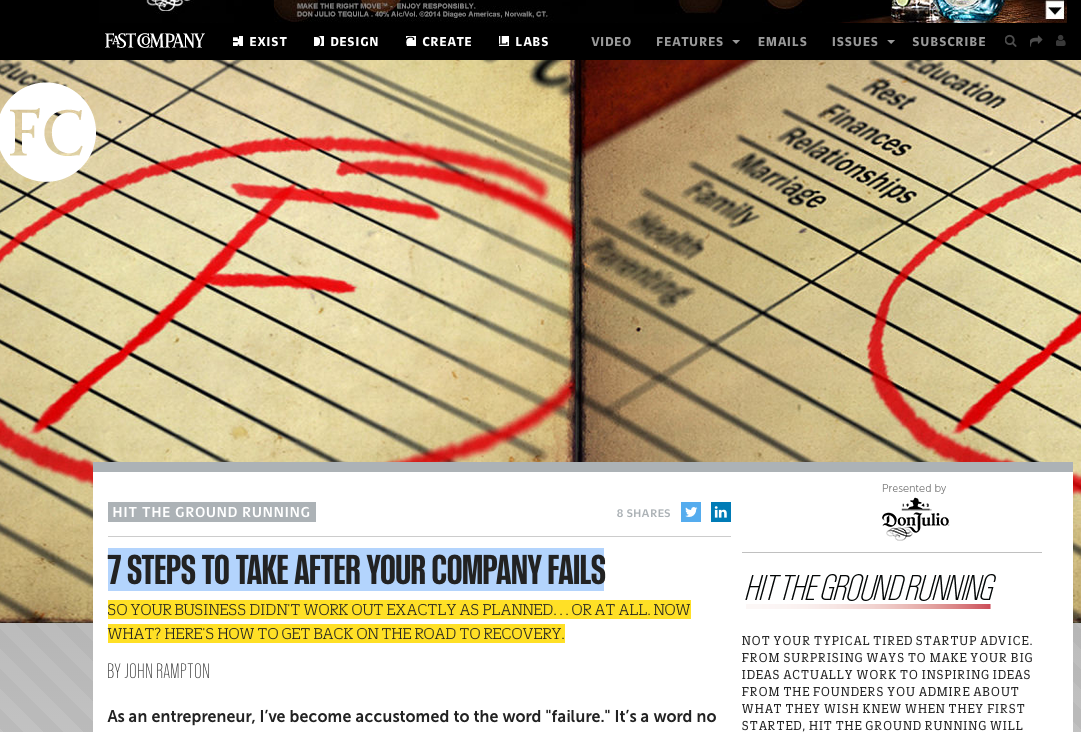As an entrepreneur, I’ve become accustomed to the word “failure.” It’s a word no one wants to say out loud, especially as someone starting a company.
However, failure is a big part of being an entrepreneur. In fact, the most successful entrepreneurs have come face-to-face with a failed business at some point. What makes a successful entrepreneur; however, is the ability to get back up and try again.
That’s not to say failure isn’t difficult. To put it bluntly—it sucks. No one wants to start a business that doesn’t succeed. But after all of the blood, sweat, and tears, you realize your company going out of business isn’t the end of the road. It’s merely a speed bump along the road to success.
After one of my businesses closed up shop within the last year, I can honestly say it didn’t impact me at all after my last epic failure when my multimillion-dollar company went from making millions a month to dying in three weeks’ time.
Here’s what I did to not let it impact me, my family, or my relationships:
1. TAKE A DEEP BREATH AND RELAX
Failure is unavoidable. No need to dwell on it. In fact, it’s almost refreshing when that struggling business comes to an end. Once you come to that conclusion, take a deep breath and let it all out. It’s been scientifically proven breathing can help calm us down, which is why you absolutely need to do it.
Once you’ve calmed down, relax. Do whatever keeps you calm. Exercise, take a hot shower, or enjoy a drink or two. This should help you digest the situation, and look at the experience differently. With some perspective, you’ll find it can be refreshing to pull the plug on something that has become a drain on both your time and resources.
2. DON’T TAKE IT PERSONALLY
Always remember even though your business failed, that doesn’t mean you are a failure. When you don’t separate these thoughts, you’re giving your self-esteem and confidence a major blow.
Imagine if Bill Gates took the failure of his first business, Traf-O-Data—which analyzed traffic data for the Washington state highway department—personally. Microsoft may have never been founded.
3. REFLECT AND ADAPT
Set emotions aside and reflect on the loss analytically.
- Why did the company fail?
- Was there any way to save it?
- What factored into the failure of the business?
Once you answer these tough questions, you should have learned a thing or two. You can take these experiences with you during the next go-around.
I spent almost a month reflecting on changes I’ll make in my next company. Try not to reflect all on the negative, but more on the positive and how it will help you in the future. This helped me not to get depressed.
4. PLAN YOUR NEXT BUSINESS
You are now a wiser and more experienced entrepreneur who has some contacts. Take all of that and put it toward your next business venture. I bet you won’t make the same mistakes again, and you’ll enjoy a successful business.
5. ENJOY YOUR FREE TIME
One of the worst aspects about being an entrepreneur is you don’t have any free time. Now that you don’t have to devote every second of the day to your company, you can enjoy yourself. Whether that’s going out to dinner with friends or taking a much-needed vacation, use your free time to recharge your batteries and catch up on all the moments you might have missed out on in the past.
6. VOLUNTEER
Typically, volunteers want to make a difference, are passionate, can spot opportunities, and enjoy being around people. Sound familiar? Those are the same traits entrepreneurs possess.
Plus, volunteering can give you a new perspective on another industry—and maybe even lead to a new business idea.
7. MAKE SOME QUICK CASH
You probably have some debt now that your business has failed. But use this as an opportunity. Sell some of that clutter taking up space in your house. Put your talents to use by offering your services as either a consultant or a developer. Many people are willing to pay you for your expertise, and can learn from you.
During this time, I started my own consultancy, Adogy. That has helped me pay the bills while I recovered both financially and emotionally.
Next, work on that app or project you’ve been putting off. I have recently started a free hosting company as my next big thing. This also has allowed me to both pay the bills and start rebuilding my dream.
Failing at a startup or company isn’t easy, and its aftermath can be devastating. The hardest part in failing is getting right back up after being shoved down so many times.
You tried something and it didn’t work out. And that’s okay—now jump up and get started on the next adventure.
Read Full Article on Fast Company


